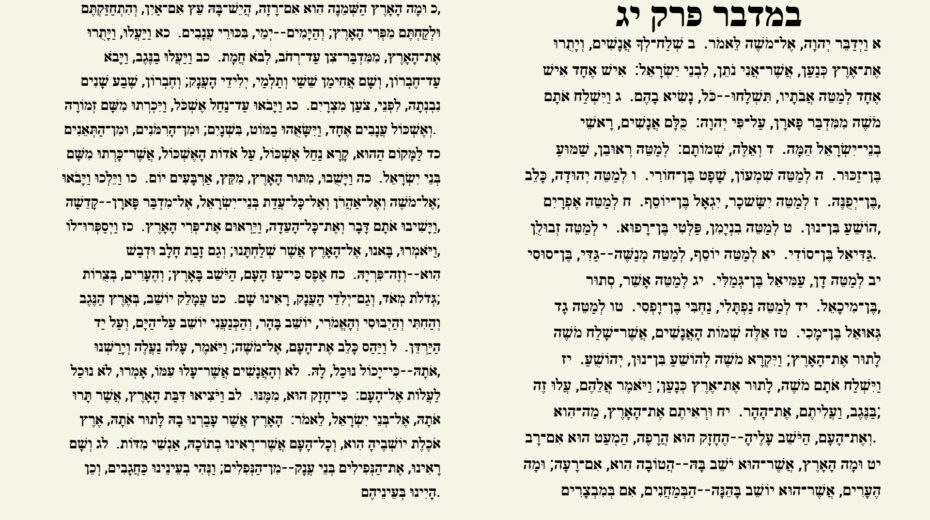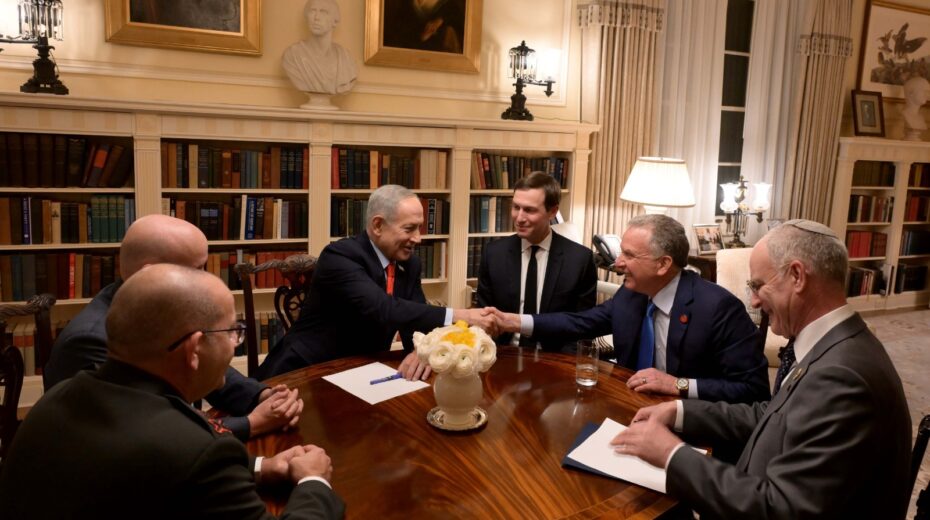Weekly Torah Portion – שְׁלַח לְךָ – Shlach Lecha – Send for Yourself; Numbers 13:1 – 15:41; Joshua 2:1 – 24
God instructs Moses to send scouts to the Promised Land—but what begins as exploration ends in fear, doubt, and a national crisis. Only two see clearly: Caleb and Joshua recognize the potential, not just the danger. Their perspective teaches us that true faith does not reside in retreat but in the courageous step forward—despite all challenges.
This week’s portion is like a glimpse into the future. God commands Moses to send men to scout the land—to see, learn, and discover the new and unknown place.
“And the Lord spoke to Moses: Send men to scout the land of Canaan, which I am giving to the Israelites. Send one man from each of their fathers’ tribes—each one a leader.”
The story’s progression is well-known. The scouts return and describe the land as “a land that devours its inhabitants.” Except for Caleb son of Jephunneh and Joshua son of Nun, they all advise against entering it. With this, they seal the fate of the entire people: 40 years of wandering in the desert, one year for each day of scouting, until the generation of the desert, the generation of slaves, has died out.
The scouts’ words can be seen as an expression of disbelief and insecurity, a slave’s perspective, a deficient way of seeing. And all of that is true. But there’s another interpretation: perhaps the scouts weren’t afraid of failure but of success. Because success would have demanded a radical change in their way of life.
Their mistake was one common among religious people. They wanted to spend their entire lives under God’s protection, as close to Him as possible. But they didn’t understand that God wants something else: to dwell with us here on earth. A careful reading of the texts reveals the real world and life itself—that’s where God wants us to be. That’s where He sends us. That’s where He led Moses and the people of Israel.
How comfortable the desert was, and how challenging it is to leave that detachment from reality and enter an inhabited, real world with all that entails. The scouts who returned from the land described it thus:
“And they told him, ‘We came to the land where you sent us, and indeed it flows with milk and honey—this is its fruit! But the people who dwell in it are strong, and the cities are fortified and very large. And we also saw the descendants of Anak there. Amalek dwells in the Negev, the Hittites, Jebusites, and Amorites dwell in the hill country, and the Canaanites dwell by the sea and along the Jordan.’”
A land flowing with milk and honey, inhabited, fortified, full of other peoples. So far, all correct. They reported what they saw, and it was all true. But then they added:
“And they spread a bad report about the land they had scouted, saying, ‘The land we passed through to scout—it devours its inhabitants! And all the people we saw there are of great stature. We saw the giants, the sons of Anak, from the Nephilim—and we seemed to ourselves like grasshoppers, and so we must have seemed in their eyes.’”
This was their interpretation, shaped by their inner worldview and mindset. The land is good—but it devours its inhabitants. It’s rich, but it demands much. It gives, but it takes.
And in their words, you could hear: “How are we supposed to handle this task? Giants live there; they make us seem like grasshoppers—how can we defeat them? We feel weak, worthless, powerless. We’re used to seeing the world from a slave’s perspective, not a master’s. How are we to overcome these menacing challenges?”
I don’t doubt that the scouts took their task seriously, as a divine mission, and that they fulfilled it. But perhaps the task was too great for them? Perhaps they suddenly realized what it truly means to be free, to be a people that governs a land? And perhaps they preferred the “comfortable” life in the desert—just as they once preferred the “comfortable” life in Egypt?
In my nearly 60 years of life, I’ve often wondered: Why are there so many wars in Israel? I’ve frequently prayed for quiet, comfortable days, longed for a life in the silent closeness of God, and was disappointed by the answers I received. It took me a long time to understand: God wants something else. He wants courage, faith, action, boldness. That’s His and our path to feeling “togetherness.” And to this day, I confess: I keep falling back into the mindset of the ten scouts, and from there, I must repeatedly rise.
This mindset, these fears and worries, the scouts easily transferred to the entire people, who became very afraid and refused to continue toward the Promised Land, the land of great opportunities. I once read a saying that made me think deeply: “Our deepest fear is not that we are inadequate. Our deepest fear is that we are powerful beyond measure.” To truly internalize this and live by it, to be a light in the world, a true leader, requires great faith and a broad perspective. A bird’s-eye view that sees beyond the current moment. One that manages to connect all the dots into a meaningful whole.
And indeed, in our portion, there were two exceptional people who rose above this narrowness—Caleb and Joshua. They saw the land with eyes of faith and courage. They were ready to see strength, including the strength of the people. They saw the beauty and advantages of the land, despite its many challenges. And though they saw exactly the same things as the others, they chose to say something different. Because their hearts were in a different place. “We will surely overcome them!” These two never forgot for a moment who had sent them—and what power was with them and within them. “The Lord is with us—do not fear them!” The land is truly very good. The fortifications, the enemies—they are real. The land is truly challenging—no one denies that.
Just as it was then, so it is today: the land is challenging, the enemies numerous, the threats come from all sides, the loneliness is almost unbearable, the death, the fallen, the wars, the fear for our children, the sleepless nights, the rockets, explosions, suicide bombers—all of that exists, just as it did then, so too today.
But Joshua and Caleb saw something else: the strength that stands with Israel. The great possibilities. The realization of the calling God gave the people. And the path one must take to be close to God. They understood: we didn’t come to this land and this trial by chance. This is our path—to find faith, strength, and resolve. With great courage, they spoke their minds—against the majority—and were nearly stoned for it.
Even today—in times of fear, pain, and distress—it’s hard to see the challenges of our lives in the spirit of Joshua son of Nun and Caleb son of Jephunneh. It takes courage and strength to recognize one’s own power and to call out to the heart: God is with us—always. Especially in moments of fear, pain, and difficulty. But when one is certain of the path and navigates these difficult places well, one is not paralyzed by fear or held back by old mindsets that want to keep us in the desert.
There is divine providence. There is One who sees us from above—and He wants us to arrive. Therefore, our striving—as individuals, as a people, as true friends—is to embrace the spirit of Joshua and Caleb. To rise like them, to recognize our immeasurable strength, for the Lord is with us.
Shabbat Shalom!














